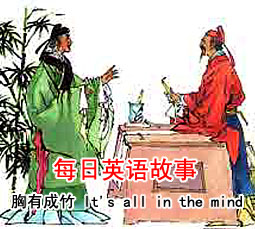People wondered why Wen Tong could draw so well. Actually, Wen Tong loved bamboo so much he had grown various bamboo around his house. No matter what season it was and no matter whether it was sunny or rainy, he used to go to the bamboo forest to observe how they were growing. He carefully observed the length and breadth of the bamboo poles as well as the shapes and colors of the leaves. Whenever he found something new, he went back to his study and drew what was in his mind on paper. After a long time, the images of the bamboo in different seasons, under different weather conditions and at different moments were deeply imprinted in his mind. Whenever he stood before the paper and picked up a painting brush, various forms of bamboo came into his mind at once. So, every time he was drawing bamboo he appeared confident and at ease. All the bamboo he drew looked like real.
When people spoke highly of his paintings, he always said modestly that he had just put the images of the bamboo imprinted in his mind in the paper.
The phrase "having the images of bamboo ready in one's bosom" means having plans or designs ready in one's mind before doing a certain job so that its success is guaranteed. It also means being calm and sober-minded in dealing with things.

古代有个画家叫文同。他画的竹子远近闻名,每天都有不少人登门求画。文同画竹的妙诀在哪里呢?原来啊,文同在自己家的房前屋后种上各种各样的竹子。无论春夏秋冬,阴晴风雨,他经常去竹林观察竹子的生长变化情况,琢磨竹枝的长短粗细,叶子的形态、颜色。每当有新的感受他就回到书房,把心中的印象画在纸上。日积月累,竹子在不同季节、不同天气、不同时辰的形象都深深地印在他的心中,只要凝神提笔,在画纸前一站,平日观察到的各种形态的竹子立刻浮现在眼前。所以每次画竹,他都显得非常从容自信,画出的竹子看上去都像真的一样。
当人们夸奖他的画时,他总是谦虚地说:“我只是把心中琢磨成熟的竹子画下来罢了。”
“胸有成竹”,比喻做事之前已作好充分准备,对事情的成功已有了十分的把握;又比喻遇事不慌,十分沉着。


